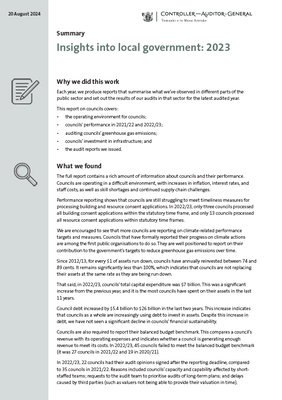Summary
 Why we did this work
Why we did this work
Each year, we produce reports that summarise what we’ve observed in different parts of the public sector and set out the results of our audits in that sector for the latest audited year.
This report on councils covers:
- the operating environment for councils;
- councils’ performance in 2021/22 and 2022/23;
- auditing councils’ greenhouse gas emissions;
- councils’ investment in infrastructure; and
- the audit reports we issued.
What we found
The full report contains a rich amount of information about councils and their performance. Councils are operating in a difficult environment, with increases in inflation, interest rates, and staff costs, as well as skill shortages and continued supply chain challenges.
Performance reporting shows that councils are still struggling to meet timeliness measures for processing building and resource consent applications. In 2022/23, only three councils processed all building consent applications within the statutory time frame, and only 13 councils processed all resource consent applications within statutory time frames.
We are encouraged to see that more councils are reporting on climate-related performance targets and measures. Councils that have formally reported their progress on climate actions are among the first public organisations to do so. They are well positioned to report on their contribution to the government’s targets to reduce greenhouse gas emissions over time.
Since 2012/13, for every $1 of assets run down, councils have annually reinvested between 74 and 89 cents. It remains significantly less than 100%, which indicates that councils are not replacing their assets at the same rate as they are being run down.
That said, in 2022/23, councils’ total capital expenditure was $7 billion. This was a significant increase from the previous year, and it is the most councils have spent on their assets in the last 11 years.
Council debt increased by $5.4 billion to $26 billion in the last two years. This increase indicates that councils as a whole are increasingly using debt to invest in assets. Despite this increase in debt, we have not seen a significant decline in councils’ financial sustainability.
Councils are also required to report their balanced budget benchmark. This compares a council’s revenue with its operating expenses and indicates whether a council is generating enough revenue to meet its costs. In 2022/23, 45 councils failed to meet the balanced budget benchmark (it was 27 councils in 2021/22 and 19 in 2020/21).
In 2022/23, 22 councils had their audit opinions signed after the reporting deadline, compared to 35 councils in 2021/22. Reasons included councils’ capacity and capability affected by short-staffed teams; requests to the audit team to prioritise audits of long-term plans; and delays caused by third parties (such as valuers not being able to provide their valuation in time).
Page created: 20 August 2024

